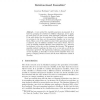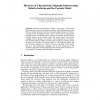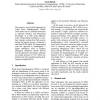157 search results - page 6 / 32 » Instance Sense Induction from Attribute Sets |
122
click to vote
MLDM
2005
Springer
15 years 7 months ago
2005
Springer
In the context of large databases, data preparation takes a greater importance : instances and explanatory attributes have to be carefully selected. In supervised learning, instanc...
136
Voted
RSCTC
1993
Springer
15 years 5 months ago
1993
Springer
This paper focuses on the application of rough set constructs to inductive learning from a database. A design guideline is suggested, which provides users the option to choose app...
108
click to vote
CAEPIA
2003
Springer
15 years 7 months ago
2003
Springer
A new method for ensemble generation is presented. It is based on grouping the attributes in dierent subgroups, and to apply, for each group, an axis rotation, using Principal Com...
112
click to vote
PKDD
2000
Springer
15 years 5 months ago
2000
Springer
: Relational representation of objects using graphs reveals much information that cannot be obtained by attribute value representations alone. There are already many databases that...
111
Voted
ACL
2006
15 years 3 months ago
2006
We present a novel hybrid approach for Word Sense Disambiguation (WSD) which makes use of a relational formalism to represent instances and background knowledge. It is built using...



